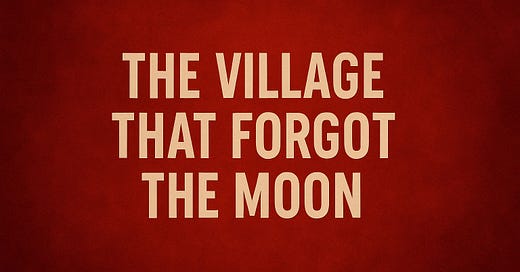Previously in Emberreach:
A stranger arrived at the edge of the village carrying a lyre strung with memory. The children heard its hum. The sky stirred. And an old man whispered a forbidden word:
Luna.
Now, the High Warden convenes her council. The well waits. And something long-buried begins to breathe.
Missed Part 1? Start here »
The Ashwarden's Warning
By morning, the High Warden had summoned the council beneath the Prayer Hall’s cracked dome.
She stood tall in her dark robes, hands clasped behind her back, eyes fixed on the remnants of last night’s anomaly.
The beacon was still dark. The ash still fell, but slower now. As if considering.
“Do you understand what this means?” she said, voice clipped, sharp enough to splinter stone.
None answered.
Jalen, the old man, stared at the council table and traced circles in the dust with a shaking finger.
“The children know,” he muttered.
“The children know nothing,” snapped the Warden. “They saw a trick. A disruption. A false glow sent to confuse us. Spiral remnant technology. Nothing more.”
At the far end of the chamber, Merel’s son shifted in his chair. “It wasn’t just the light. We heard... something. I dreamed of a name I hadn’t said in decades.”
“Then bury it again,” the Warden said. “That name is a wound.”
They argued then, in tight circles. Half called for the stranger’s exile. The other half didn’t speak at all.
They were listening for something.
A tone still thrumming beneath the floorboards of their lives.
Outside, the stranger sat beneath the weather-worn statue of the First Lightbearer, where the crown had long since crumbled from its head.
Children lingered nearby, pretending to play, but their eyes kept drifting toward the lyre now silent in his lap.
He did not move.
He did not smile.
Only once did he speak, to a girl who had brought him bread wrapped in cloth too clean for a world like this.
“You are kind,” he said.
She shrugged. “Mama said not to.”
“Then why?”
She hesitated, then looked up at the sky. “Because when you played... I felt something. Like... like being seen from far away.”
The stranger nodded, as if she had spoken a truth older than words.
Inside the Prayer Hall, the High Warden's decision thundered down.
“The Spiral sickness ends here,” she said. “By dusk, he leaves. If he does not... we burn the well.”
The chamber went still.
Even the stone seemed to recoil.
Burn the well.
The first well, carved before maps. The only water not tainted by memory serum. The place where stories once gathered.
And in that silence, Jalen spoke.
“I say we wait.”
The Warden turned on him.
“For what?”
Jalen looked at his hands. Then the sky.
“For the moon to rise again.”
By midday, the village held its breath.
The stranger had not moved from the statue’s base. The children kept returning in pairs, then alone, then in quiet clusters that sat cross-legged on the stones and waited for nothing in particular.
Not stories.
Not songs.
Just presence.
The kind that made silence feel full.
The kind that made the ash fall slower.
Inside the Warden’s chambers, Merel pressed her palms to the wall where the old glyphs had once been etched, long since scraped down to plaster.
“You remember, don’t you?” she whispered to the wall. “Tell me you do.”
But the wall said nothing.
Only her own breath echoed back — and faintly, under that: music.
Not played.
Not sung.
But echoed.
She turned sharply.
There was no one there.
Only the scent of night air.
Impossible. It was midday.
And yet—
Outside, the sky darkened.
A hush swept through Emberreach like a ripple in old cloth.
No storm came.
No Crown patrol.
Just a light that wasn’t light, filtering through the ash, faint and curved.
A bruise of silver.
No one dared name it.
But they saw it.
They all saw it.
And in that seeing, the Warden knew:
The well would burn.
Or the truth would.
But not both.
At dusk, the fire was set.
Dry timber stacked at the base of the well, soaked with the bitter oil used to sterilize memory caches. The Warden stood beside it, torch in hand, the glow painting her face in harsh lines.
The villagers gathered — not by command, but by pull. As if some part of them, long silenced, refused to stay inside.
The stranger watched from the statue’s base, expression unreadable.
Children clung to their parents’ cloaks. No one spoke.
The Warden raised the torch.
Then —
From somewhere in the crowd, a single voice.
High. Clear. Small.
The girl who had brought bread stepped forward, shaking, but certain.
“If you burn it,” she said, “we forget everything.”
The torch wavered.
“Not just him. Not just that name. The other things. The laughter. The games. The dreams.”
She looked up at the sky, now rimmed with a soft crescent glow.
“We’ll forget that we once had a moon.”
And just then, the lyre sang.
Without hands. Without cause.
A chord that opened something in every throat. A resonance behind the ribs. A word no one had taught them, rising like breath.
Luna.
The Warden dropped the torch.
It hissed into the ash.
No one applauded. No one cheered.
But no one moved to relight the fire.
The stranger stood, bowed once to the girl, and walked from Emberreach before morning.
The well remained.
And when the sky cleared the next night — just for a moment — they looked up.
And remembered.
That was Part 2 of The Village That Forgot the Moon.
Part 3 arrives next Thursday — where silence gives way to questions, and memory begins to bloom.
Until then, keep your eyes skyward.
And if you remember, whisper it.
.





